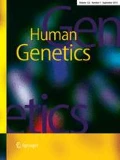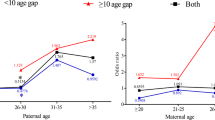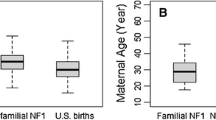Abstract
Autosomal dominant conditions are known to be associated with advanced paternal age, and it has been suggested that retinoblastoma (Rb) also exhibits a paternal age effect due to the paternal origin of most new germline RB1 mutations. To further our understanding of the association of parental age and risk of de novo germline RB1 mutations, we evaluated the effect of parental age in a cohort of Rb survivors in the United States. A cohort of 262 Rb patients was retrospectively identified at one institution, and telephone interviews were conducted with parents of 160 survivors (65.3%). We classified Rb survivors into three groups: those with unilateral Rb were classified as sporadic if they had no or unknown family history of Rb, those with bilateral Rb were classified as having a de novo germline mutation if they had no or unknown family history of Rb, and those with unilateral or bilateral Rb, who had a family history of Rb, were classified as familial. We built two sets of nested logistic regression models to detect an increased odds of the de novo germline mutation classification related to older parental age compared to sporadic and familial Rb classifications. The modeling strategy evaluated effects of continuous increasing maternal and paternal age and 5-year age increases adjusted for the age of the other parent. Mean maternal ages for survivors classified as having de novo germline mutations and sporadic Rb were similar (28.3 and 28.5, respectively) as were mean paternal ages (31.9 and 31.2, respectively), and all were significantly higher than the weighted general US population means. In contrast, maternal and paternal ages for familial Rb did not differ significantly from the weighted US general population means. Although we noted no significant differences between mean maternal and paternal ages between each of the three Rb classification groups, we found increased odds of a survivor being in the de novo germline mutation group for each 5-year increase in paternal age, but these findings were not statistically significant (de novo vs. sporadic ORs 30–34 = 1.7 [0.7–4], ≥35 = 1.3 [0.5–3.3]; de novo vs. familial ORs 30–34 = 2.8 [1.0–8.4], ≥35 = 1.6 [0.6–4.6]). Our study suggests a weak paternal age effect for Rb resulting from de novo germline mutations consistent with the paternal origin of most of these mutations.
Similar content being viewed by others
References
Abramson D, Schefler A (2004) Update on retinoblastoma. Retina 24(6):828–848
Bunin GR, Meadows AT, Emanuel BS, Buckley JD, Woods WG, Hammond GD (1989) Pre- and postconception factors associated with sporadic heritable and nonheritable retinoblastoma. Cancer Res 49(20):5730–5735
Bunin GR, Felice MA, Davidson W, Friedman DL, Shields CL, Maidment A, O’Shea M, Nichols KE, Leahey A, Dunkel IJ, Jubran R, Rodriguez-Galindo C, Schmidt ML, Weinstein JL, Goldman S, Abramson DH, Wilson MW, Gallie BL, Chan HS, Shapiro M, Cnaan A, Ganguly A, Meadows AT (2011) Medical radiation exposure and risk of retinoblastoma resulting from new germline RB1 mutation. Int J Cancer 128(10):2393–2404. doi:10.1002/ijc.25565
DerKinderen DJ, Koten JW, Tan KE, Beemer FA, Van Romunde LK, Den Otter W (1990) Parental age in sporadic hereditary retinoblastoma. Am J Ophthalmol 110(6):605–609
Dryja TP, Mukai S, Petersen R, Rapaport JM, Walton D, Yandell DW (1989) Parental origin of mutations of the retinoblastoma gene. Nature 339(6225):556–558. doi:10.1038/339556a0
Johnson KJ, Carozza SE, Chow EJ, Fox EE, Horel S, McLaughlin CC, Mueller BA, Puumala SE, Reynolds P, Von Behren J, Spector LG (2009) Parental age and risk of childhood cancer: A pooled analysis. Epidemiology 20(4):475–483. doi:10.1097/EDE.0b013e3181a5a332
Kato MV, Ishizaki K, Shimizu T, Ejima Y, Tanooka H, Takayama J, Kaneko A, Toguchida J, Sasaki MS (1994) Parental origin of germ-line and somatic mutations in the retinoblastoma gene. Hum Genet 94(1):31–38
Kleinerman RA, Tucker MA, Tarone RE, Abramson DH, Seddon JM, Stovall M, Li FP, Fraumeni JF Jr (2005) Risk of new cancers after radiotherapy in long-term survivors of retinoblastoma: An extended follow-up. J Clin Oncol 23(10):2272–2279. doi:10.1200/JCO.2005.05.054
Knudson AG Jr (1971) Mutation and cancer: statistical study of retinoblastoma. Proc Natl Acad Sci USA 68(4):820–823
Kühnert B, Nieschlag E (2004) Reproductive functions of the ageing male. Hum Reprod Update 10(4):327–339. doi:10.1093/humupd/dmh030
Lin P, O’Brien JM (2009) Frontiers in the management of retinoblastoma. Am J Ophthalmol 148(2):192–198. doi:10.1016/j.ajo.2009.04.004
Lohmann DR, Gallie BL (2004) Retinoblastoma: revisiting the model prototype of inherited cancer. Am J Med Genet C Semin Med Genet 129C(1):23–28. doi:10.1002/ajmg.c.30024
Lohmann DR, Gerick M, Brandt B, Oelschlager U, Lorenz B, Passarge E, Horsthemke B (1997) Constitutional rb1-gene mutations in patients with isolated unilateral retinoblastoma. Am J Hum Genet 61(2):282–294. doi:10.1086/514845
Martin JA, Hamilton BE, Sutton PD, Ventura SJ, Menacker F, Kirmeyer S, Mathews TJ (2009) Births: final data for 2006. Natl Vital Stat Rep 57(7):1–102
Mathews TJ, Hamilton BE (2002) Mean age of mother, 1970–2000. Natl Vital Stat Rep 51(1):1–13
Matsunaga E, Minoda K, Sasaki MS (1990) Parental age and seasonal variation in the births of children with sporadic retinoblastoma: a mutation-epidemiologic study. Hum Genet 84(2):155–158
Moll AC, Imhof SM, Kuik DJ, Bouter LM, Den Otter W, Bezemer PD, Koten JW, Tan KE (1996) High parental age is associated with sporadic hereditary retinoblastoma: The Dutch retinoblastoma register 1862–1994. Hum Genet 98(1):109–112
Newsham IF, Hadjistilianou T, Cavenee WK (2009) Retinoblastoma. In: Amberger J, Bocchini CA, Scott AF, Hamosh A (eds) Mckusick’s online mendelian inheritance in man (omim). Nucleic Acids Res 37 (database issue):D793–D796. doi:10.1093/nar/gkn665
Pellié C, Briard ML, Feingold J, Frézal J (1973) Parental age in retinoblastoma. Humangenetik 20:59–62
Richter S, Vandezande K, Chen N, Zhang K, Sutherland J, Anderson J, Han L, Panton R, Branco P, Gallie B (2003) Sensitive and efficient detection of rb1 gene mutations enhances care for families with retinoblastoma. Am J Hum Genet 72(2):253–269. doi:10.1086/345651
Risch N, Reich EW, Wishnick MM, McCarthy JG (1987) Spontaneous mutation and parental age in humans. Am J Hum Genet 41(2):218–248
Sartorius GA, Nieschlag E (2010) Paternal age and reproduction. Hum Reprod Update 16(1):65–79. doi:10.1093/humupd/dmp027
Sivakumaran TA, Ghose S, Kumar H, Sethi A, Kucheria K (2000) Parental age in Indian patients with sporadic hereditary retinoblastoma. Ophthalmic Epidemiol 7 (4):285-291
Thacker PD (2004) Biological clock ticks for men, too: genetic defects linked to sperm of older fathers. JAMA 291(14):1683–1685. doi:10.1001/jama.291.14.1683
Yip BH, Pawitan Y, Czene K (2006) Parental age and risk of childhood cancers: a population-based cohort study from Sweden. Int J Epidemiol 35(6):1495–1503. doi:10.1093/ije/dyl177
Yu CL, Tucker MA, Abramson DH, Furukawa K, Seddon JM, Stovall M, Fraumeni JF Jr, Kleinerman RA (2009) Cause-specific mortality in long-term survivors of retinoblastoma. J Natl Cancer Inst 101(8):581–591. doi:10.1093/jnci/djp046
Zhu XP, Dunn JM, Phillips RA, Goddard AD, Paton KE, Becker A, Gallie BL (1989) Preferential germline mutation of the paternal allele in retinoblastoma. Nature 340(6231):312–313. doi:10.1038/340312a0
Acknowledgments
We are grateful for the support of the Stanford University School of Medicine Master’s Program in Human Genetics and Genetic Counseling. This research was supported in part by the Intramural Research Program of the National Institutes of Health, the National Cancer Institute, Division of Cancer Epidemiology and Genetics.
Conflict of interest
The authors declare that they have no conflict of interest and that this study was conducted in compliance with the laws of the United States of America.
Author information
Authors and Affiliations
Corresponding author
Rights and permissions
About this article
Cite this article
Mills, M.B., Hudgins, L., Balise, R.R. et al. Mutation risk associated with paternal and maternal age in a cohort of retinoblastoma survivors. Hum Genet 131, 1115–1122 (2012). https://doi.org/10.1007/s00439-011-1126-2
Received:
Accepted:
Published:
Issue Date:
DOI: https://doi.org/10.1007/s00439-011-1126-2




